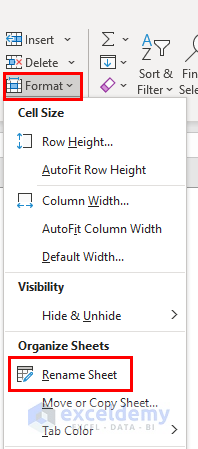Rename All Excel Sheets in One Go: Easy Methods

Managing a multitude of Excel sheets can often become an overwhelming task, especially when they require naming adjustments. Excel users often find themselves wanting to batch rename sheets for consistency, readability, or project updates. Luckily, there are several methods to do this efficiently, whether you are a beginner or an Excel wizard. Here's a comprehensive guide to rename all Excel sheets in one go.
Why Rename Excel Sheets?

Renaming Excel sheets is not just about organization. It’s also about:
- Enhancing clarity and readability when presenting data.
- Streamlining your workflow by enabling quick navigation.
- Ensuring consistency across collaborative work.
- Making data management easier for future reference.
Method 1: Using Excel’s Built-In Tools


Excel provides basic functionality for renaming sheets, but for batch operations, we'll need to dive a bit deeper.
Step-by-Step Guide to Rename Using Built-In Tools

- Open your workbook.
- Right-click on the sheet tab you want to rename.
- Select "Rename" and type the new name.
- Press Enter to finalize the rename.
Method 2: Using VBA Script


For bulk operations, Visual Basic for Applications (VBA) is your go-to tool.
Using VBA to Rename All Sheets

Sub RenameAllSheets()
Dim ws As Worksheet
Dim newName As String
Dim i As Integer
For i = 1 To ThisWorkbook.Sheets.Count
Set ws = ThisWorkbook.Sheets(i)
newName = "Sheet_" & i
ws.Name = newName
Next i
End Sub
💡 Note: This script will rename all sheets sequentially as "Sheet_1", "Sheet_2", etc. You can modify the naming logic to suit your needs.
Method 3: Using an Excel Add-In


Some Excel add-ins offer bulk renaming capabilities. Here's how you might use one:
- Search for an Excel add-in in the Microsoft Store or elsewhere that supports batch renaming.
- Install and open the add-in within Excel.
- Follow the add-in's interface instructions to rename your sheets.
Method 4: External Automation Tools


Tools like Power Automate or AutoHotkey can automate Excel tasks, including renaming sheets.
Using AutoHotkey for Batch Renaming

- Install AutoHotkey from the official website.
- Create a script that opens Excel, navigates to the workbook, and uses hotkeys or commands to rename each sheet.
- Run the script when needed.
In the wrap-up, mastering the art of renaming Excel sheets in bulk not only saves time but also improves the overall structure and clarity of your workbooks. From the simplicity of Excel's built-in tools for smaller projects to the power of VBA scripts and external automation for large-scale operations, there's a method suited to every Excel user's needs. Remember, while efficiency is key, so is accuracy. Always backup your work before implementing bulk changes to avoid data loss. By employing these methods, you'll be able to maintain a well-organized and coherent Excel workspace that will make data management, collaboration, and analysis much more manageable.
Can I revert the batch renaming of Excel sheets?

+
Reverting batch renaming isn’t a built-in Excel feature, but you can manually rename sheets back or use VBA to undo the renaming if you have a backup or an undo script.
Is there a risk of losing data when renaming sheets?

+
When renaming sheets, Excel doesn’t delete or modify the data within them. However, always backup your workbook before performing bulk operations to prevent accidental data loss or unexpected changes.
Can these methods be applied in Google Sheets?

+
Google Sheets has different functionalities, but renaming sheets in bulk is possible using Google Apps Script, which is similar to VBA in functionality.



